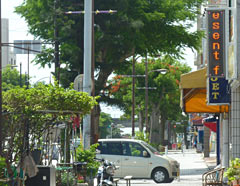Consumer confidence among U.S. military personnel falls due to the strong yen

Shops with English language signs at the Koza Gate Street. The recent sharp appreciation of the yen against the dollar dampens the spending of U.S. military personnel in Okinawa City (on July 27).
July 29, 2011 Ryota Shimabukuro of the Ryukyu Shimpo
With the yen’s recent sharp appreciation against the U.S. dollar due to the United States debt ceiling crisis, Okinawa City, which plays host to U.S. military bases, is experiencing a downturn in consumer spending by U.S. military and civilian personnel, who do most of their shopping in dollars.
During the past ten years, the Prefecture has observed sluggish movement in currency exchange from dollars to yen. The yen has been appreciating from 120-130s to around 80 against the dollar.
Some people in Okinawa City suggest that the city should mull over these developments calmly before making some fundamental changes.
There are shops with English language signs in Koza Gate Street, which leads to Kadena Air Base, but fewer U.S. military personnel are seen shopping in the area these days.
The chairman of the Koza Gate Street Association, Seiei Gakiya, an eyewear shop owner, pointed out that United States debt ceiling crisis has dampened the consumer appetite of U.S. military personnel, saying “Although the U.S. dollar has been a universal currency for quite some time, America’s monetary problems are being reported all over the world, making U.S. military personnel in Okinawa more budget-minded.”
Gakiya said, “The Association cannot do anything to reverse trends in the world economy, but we would like the prefectural government and Okinawa Chamber of Commerce and Industry to urgently think of ways to deal with the yen appreciation.”
But at the same time, Gakiya said, “The yen has been appreciating for a long time. While 80% of our customers used to be U.S. military personnel, those numbers have been steadily decreasing. It is possible that they are shopping inside the bases or even go to other municipalities, which could explain the decrease.”
Gakiya continued, “We need to take drastic measures to find a way out of this situation.”
It is reported that currency conversion from the yen to the dollar started to rapidly show a declining trend at the Lucky Exchange Center, located in Koza Music Town, when the yen began rising above 80 yen against the dollar.
The staff of the center said, “U.S. military personnel tend to convert the minimum amount of dollars to yen for their essential expenses.”
Some U.S. military personnel or retired military personnel are reported to have complained after seeing the amount of cash they get in a dollar-yen conversion, saying “This place used to be a paradise, but now I’d like to go back to the United States.”
Micky, the family restaurant in Koza’s Central Park Avenue, has been operating at the exchange rate of 100 yen per dollar despite the appreciation of the yen. While the cost of ingredients has been rising during these times of business difficulties, the yen’s appreciation further serves to aggravate the situation. Although you can still purchase a five dollar set-menu for 500 yen, its sales takings amount to only 400 yen when converted at the current exchange rate. Eriko Kadena, the owner of the restaurant said, “The sales point of our restaurant has been that you can eat a hearty set menu for one 500-yen coin. But there is a limit to how far we can reduce the amount of ingredients to avoid price increases.”
(English Translation by T&CT, Mark Ealey)
Previous Article:Shinugu – an animistic festival for a good crop and perfect health
Next Article:U.S. military returns Gimbaru Training Area to the locals
[Similar Articles]
- 122 billion yen paid by Japan for the relocation of U.S. forces to Guam but its use is still up in the air
- The streets of U.S. bases become ghost towns as restrictions on leaving residences begin, food and drink establishments hope for a “quick resolution”
- Walking tour around scene of Koza riot to learn about nonviolence
- Koza Night Tour popular
- Pula-kun, popular Yuru-Chara of Ginten Street Shopping Mall
 Webcam(Kokusai Street)
Webcam(Kokusai Street)


